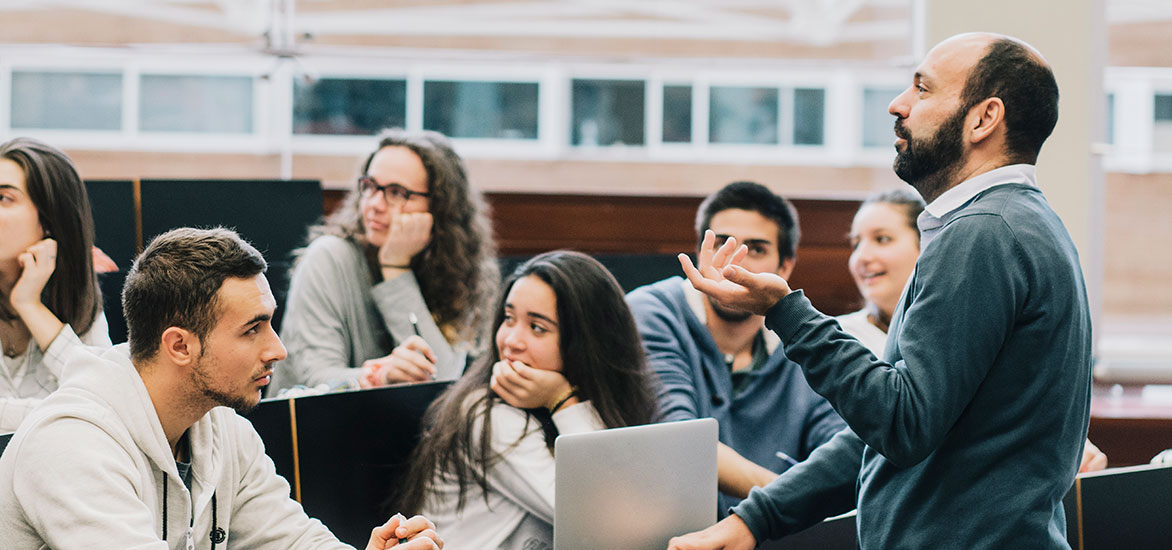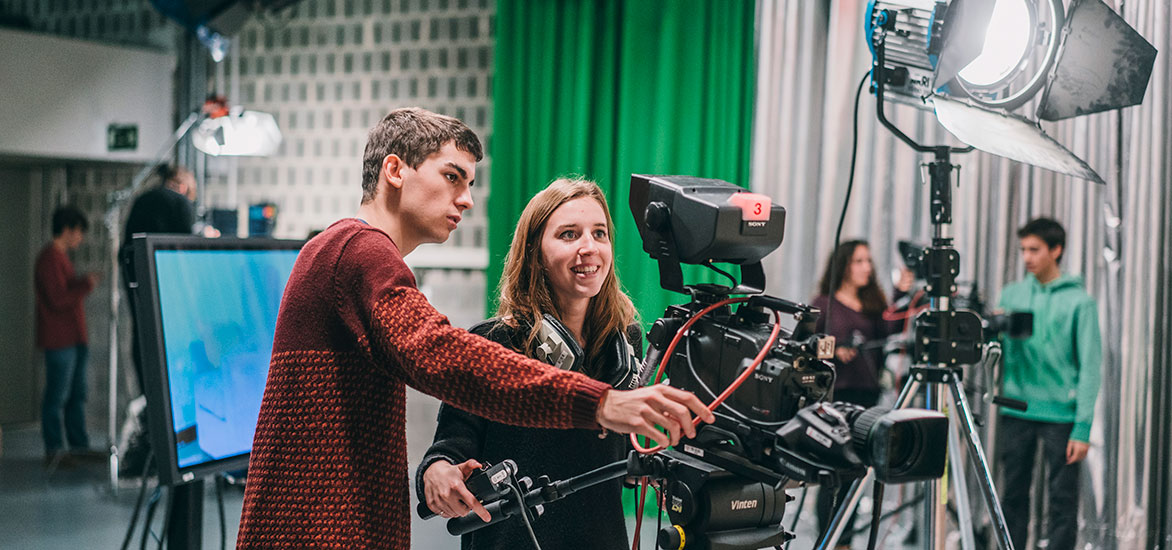Teaching
«A distinctive and personalized education model
that enables the pursuit of personal projects with a unique
and flexible proposal for each student.»

From the start, UPF has been characterized by the quality of its teaching. The keys to this quality are, among other things, its commitment to innovation in teaching through the continuous training of faculty, the incorporation of information and communication technology into teaching, continuous pedagogical renewal, the introduction of formulas for providing personalized service to students, and the advocacy and promotion of multilingualism in the classroom. All of these elements contribute to a student-centred educational model that offers solid basic training in each disciplinary field. This model likewise seeks to produce well-educated citizens, from both an academic and human perspective, able to adapt to change (skills related to flexibility, communication, critical thinking, social commitment, etc.). Strict criteria for continuing studies and a strong framework for assessing skills have also contributed to the model’s performance.
Taking into account, moreover, that the university’s objectives are not conveyed solely in the classroom, we are speaking of an educational model, not a teaching model, as it includes all the activities that contribute to learning at UPF.
Likewise, the university has made a clear commitment to teaching internationalization. As a result, it boasts good mobility rates and is the most popular European university for Erasmus students relative to its size.
UPF students, intensely dedicated to learning, achieve very high performance rates and have a good record of graduate employment, as well. They are also highly satisfied with their educational experience at the university. As a result of all of these factors, as well as their distinctive features, many of UPF’s degree programmes have become educational benchmarks within both the Catalan and Spanish university systems. Nevertheless, we must continue working to increase the recognition afforded to UPF alumni in all fields and at all levels, from bachelor’s degree programmes to PhDs, and to maintain and promote highly demanding standards that, in addition to including training in values and to promoting a clear social commitment, will allow our students to develop their full potential.
«Training that goes beyond the classroom to integrate the teaching, research, social and human dimensions.»
Teaching strategies
To consolidate a unique education model:
With a flexible educational proposal that is unique to each student – with active learning models that encourage responsibility, afford them a more prominent role, and promote critical thinking – but also promotes collaborative work.
With motivated and innovative faculty who serve as guides and mentors to students. Faculty must receive the necessary support to allow them to address each student’s individualities, as well as appropriate and sufficient incentives to encourage and reward their teaching.
Combining research and teaching in the learning process, so that faculty involve their students in the university’s research activities. To this end, it is necessary to include specific skills in bachelor’s degree subjects, link bachelor’s degree and master’s degree final projects to research groups, promote projects that make research a longitudinal priority, and aspire to make it possible for all faculty members to teach in undergraduate programmes.
Emphasizing communication skills as a general trait of UPF students, linked to the exercise of critical and reflective thinking and the ability to explain a personal or professional project, orally and in writing, in the university’s three working languages. All curricula should include subjects and methodologies that foster these skills.
Redefining face-to-face teaching in the learning process, so as to include the full range of possibilities technology offers today in order to separate the personal interactive and educational processes from processes of discovery and knowledge and to create new spaces for teaching. We must take advantage of all opportunities, both of face-to-face and online teaching and of hybrid methodologies and new models based on inverting the teacher and student roles.
Involving students in activities related to social commitment and in social projects integrated into teaching methodology and the learning process, and encouraging all students to engage in volunteering and social responsibility activities during their years at UPF.
To respond to the changing demand for quality education:
With innovative, quality degree programmes, which can be of interest to both local and foreign students, and striving to continually improve them in order to offer the best possible education.
Promoting general skills in undergraduate and postgraduate programmes through a variety of initiatives, such as new interdisciplinary programmes, the inclusion of minors in very different disciplines, interdisciplinary final projects and greater curricular flexibility.
Offering students more opportunities to develop their talent, in a way that allows them to hone their skills and that takes into account different learning speeds, in order to maintain and stimulate their motivation throughout the study cycle.
Attracting students from outside the EU, making a special effort to promote UPF’s bachelor’s degree programmes among these students, in order to fully integrate them into the university’s core academic offerings and promote mobility and the resulting enrichment of the university environment.
Expanding postgraduate academic offerings, in order to attract a larger number of both national and international students, and enhancing the specialization tracks, professionalizing components and academic reputations of the master’s degree programmes.
Internationalizing the classroom with measures such as including new content in subjects, promoting both a strong oral and written command of the university’s three working languages and the learning of other foreign languages in addition to English, and promoting linguistic and cultural diversity in all spaces used for instruction.
Providing more support for graduate employment, with a broader selection of curricular and extracurricular internships and personalized support for students both during the acquisition of professional skills and in finding employment.

Some measures of success
- To have implemented a plan, by 2020, to promote a more direct relationship between undergraduate and postgraduate students and the research activities carried out at the university.
- To increase the percentage of undergraduate students who participate in international mobility programmes (e.g. Erasmus) to more than 40% by 2020 (up from 30% in the 2014-2015 academic year).
- To increase the percentage of new enrolments corresponding to foreign students who plan to complete an entire bachelor’s programme to 10% of all new enrolments for each cohort by 2020 (up from 6% in the 2015-2016 academic year).
- To consolidate the existing programmes for personalizing study programmes (Tutorial Action Plan, Open Programme) and have implemented a new cross-disciplinary training programme by 2020.
- To offer at least one innovative, internationalizing undergraduate programme in each of the university’s fields of knowledge, including double degree programmes and joint programmes with foreign universities, by 2020.
- To increase the percentage of students who complete a professional internship as part of their undergraduate training to 70% by 2025 (up from 50% in the 2014-2015 academic year).
- To achieve a percentage of 20% of students able to certify a level of C1 or C2 in English or a second foreign language by 2025.
